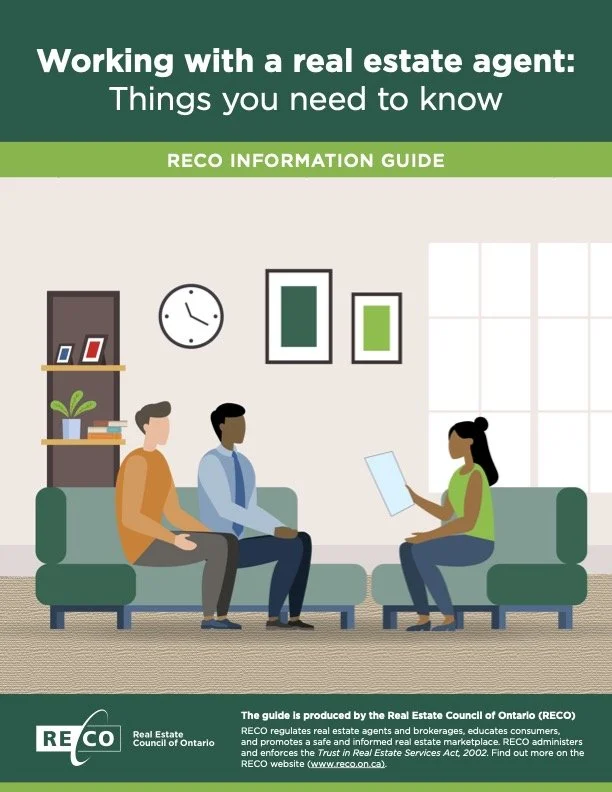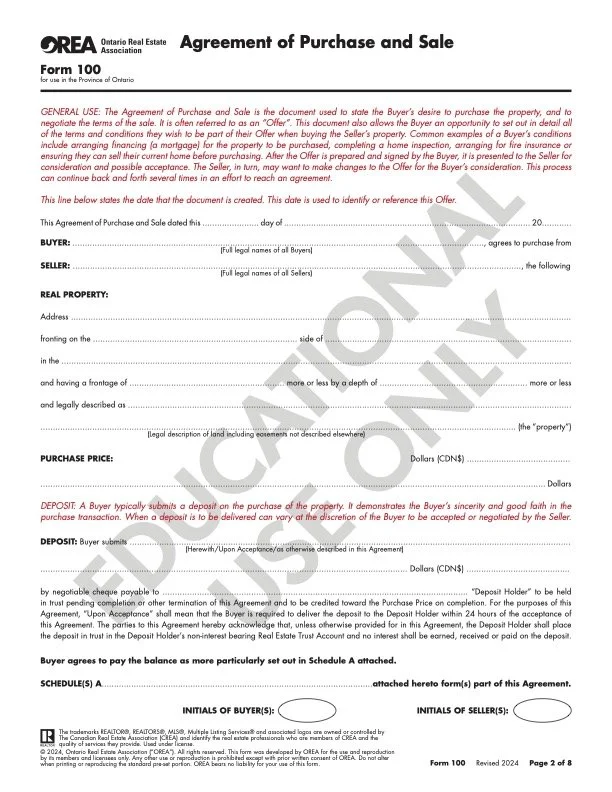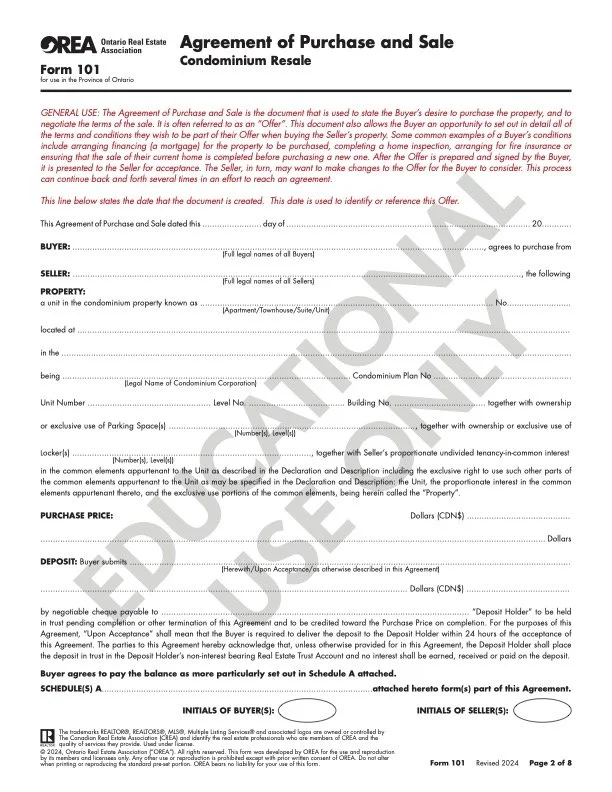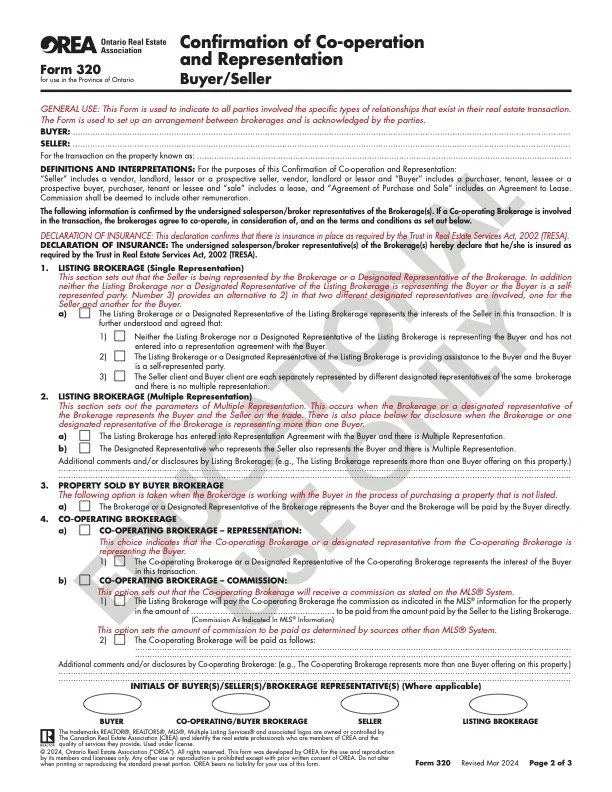Sellers
Understanding Seller Real Estate Forms in Ontario
Selling a home in Ontario comes with a lot of paperwork, and understanding the legal documents involved is key to a smooth transaction. From listing your property to finalizing the sale, each form plays a vital role in protecting your interests.
This website simplifies the essential real estate forms for sellers, breaking down complex legal terms into clear, easy-to-understand explanations. Whether you're selling for the first time or have experience in the market, knowing what you’re signing is crucial.
Explore our guides to learn about the Listing Agreement, Agreement of Purchase & Sale, and other important documents—so you can confidently navigate the selling process.
Essential Seller REAL ESTATE Forms in ONTARIO
1. RECO Information Guide
The RECO Information Guide, introduced in 2023, is the first document you’ll receive when working with a realtor. It’s required by the Real Estate Council of Ontario (RECO) and explains:
The benefits of working with a realtor vs. selling on your own
The duties AND OBLIGATIONS of agents and brokerages
The Commission and representation agreements
The disclosure rules in multiple-offer situations
The Other key topics like multiple representation and filing a complaint with RECO
Your realtor will review this guide with you, and you’ll need to sign it to confirm you received and understood it.
2. Listing Agreement – OREA Form 200
The Listing Agreement is the contract that allows a brokerage to list your home for sale. It includes:
Whether the property will be listed on MLS or exclusively
Brokerage and seller details
Designated Representation (specific agent responsible for your sale)
Listing duration (must be at least 60 days for Ottawa MLS)
Asking price (fully at the Seller’s discretion)
Commission details, including the portion offered to the Buyer’s agent
The Holdover Clause – What It Means
If a buyer who saw your home during the listing period purchases it privately within a set period after your contract expires (usually 90 days), you may still owe commission to your original agent.
Other Key Sections
Representation Rules – Defines multiple representation and what information can be shared between Buyer and Seller.
Marketing Permission – Authorizes the brokerage to advertise your property. As of 2023, public marketing (e.g., “Coming Soon” signs) requires the property to be listed on MLS within three days.
Referral of Enquiries – You must inform your agent if a Buyer approaches you directly.
Finder’s Fees – Discloses any referral fees a brokerage may receive.
Liability & Insurance – Confirms the Seller has property insurance and won’t hold the brokerage liable for damages during the listing period.
Spousal Consent – Required for the sale of a matrimonial home (consult a lawyer if unsure).
3. Self-Represented Party (SRP) Acknowledgement Form
If you choose to sell your home without a realtor, you must sign the SRP form, confirming that you won’t receive any professional advice on pricing, negotiations, or contract terms.
4. FINTRAC Identification Record
A federal requirement to verify your identity and comply with anti-money laundering laws.
5. Offer Paperwork – Agreement of Purchase & Sale (APS)
The APS is the legal contract for selling your home. Since all Ontario real estate deals must be in writing, this document outlines:
Buyer & Seller names
Property details (lot number, condo corporation, etc.)
Purchase price & deposit terms
Offer expiration time
Closing date
Inclusions & exclusions (e.g., appliances, fixtures)
Rental items (e.g., hot water tank)
Condo fees & parking details (if applicable)
HST applicability (usually not for resale homes)
Legal instructions for lawyers
Attached Schedules
Schedule A – Buyer’s brokerage terms (e.g., financing, inspections).
Schedule B – Seller’s brokerage terms (e.g., deposit handling, liability limits).
Important APS Considerations
⚠️ Time is critical – If an offer expires at 11:59 PM, it cannot be accepted at 12:01 AM.
⚠️ Delivery matters – The accepted APS must be delivered before expiry (often via email).
⚠️ Time zone relevance – The property’s location determines the time zone (not where the Buyer or Seller is).
⚠️ All changes must be initialed – Any handwritten or added terms must be acknowledged by all parties.
⚠️ Brokerages & agents are not parties – The APS is a legal contract between the Buyer and Seller, facilitated by real estate professionals.
6. Confirmation of Cooperation – OREA Form 320
This form defines the commission agreement between the Buyer’s and Seller’s brokerages. It also clarifies:
Whether the Buyer and Seller have their own agents (separate brokerages)
Whether the same brokerage represents both sides (Brokerage Representation)
Whether the same agent represents both parties (Designated Representation / Multiple Representation)
Both brokerages must sign this document to confirm cooperation terms.
7. Additional Forms You May Need
Staging Contract – If staging is included in your agent’s services.
Showing Instructions – Outlines how and when agents can show your home.
Offer Presentation Direction – If you plan to set a specific offer review date.
Lockbox Consent Form – Approves using a lockbox for agent access.
Open House Consent Form – Limits liability during public open houses.
FINAL THOUGHTS
Real estate paperwork isn’t as complicated as it looks, but it’s crucial to understand what you’re signing. Your agent should guide you through every document—if anything is unclear, ask!
Selling your home is a big decision, and knowing these forms ensures you’re making informed and confident choices in Ottawa’s market.
Let’s work together
Book a FREE consultation to learn more about our BUYING and SELLING strategIES




